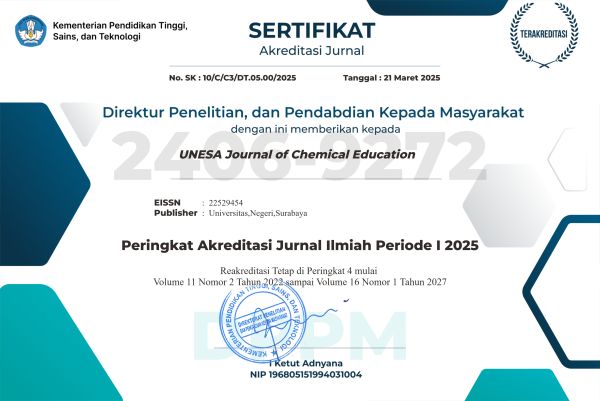IMPLEMENTASI KONSTRUKSI PENDEKATAN STEM DALAM PEMBELAJARAN KIMIA
DOI:
https://doi.org/10.26740/ujced.v14n1.p56-65Keywords:
STEM, model pembelajaran, kimiaAbstract
Penulisan artikel ini ditujukan untuk mendeskripsikan konsep STEM dan implementasi pendekatan STEM pada pembelajaran kimia. Penelitian ini menggunakan metode kajian literatur dan analisis konten untuk mengkaji pendekatan STEM di tingkat Madrasah Aliyah/SMA. Data diperoleh dari berbagai sumber cetak dan elektronik, seperti buku, jurnal, dan laporan penelitian. Analisis konten dari 62 artikel diperoleh 20 artikel yang digunakan untuk memahami teori dan konsep secara mendalam. Berdasarkan beberapa sumber literatur yang telah dianalisis, implementasi pendekatan STEM sudah banyak diterapkan dalam pembelajaran. Penggabungan pendekatan STEM dengan model pembelajaran dan pembentukan pola pikir siswa menjadi yang paling menarik untuk dianalisis. Dari berbagai sumber tersebut pendekatan STEM terpadu dengan dengan model pembelajaran inquiry berdasarkan pendekatan design thinking yang paling cocok digunakan pada pembelajaran kimia.
Downloads
References
Salvatore, S., White, C., and Podowitz-Thomas, S. 2024. “Not A Cookie Cutter Situation”: How Neurodivergent Students Experience Group Work in Their Stem Courses. International Journal of STEM Education, Vol. 11, No. 1, pp. 1‒35.
Li, Z. and Oon, P. T. 2024. The Transfer Effect of Computational Thinking (Ct)-Stem: A Systematic Literature Review and Meta-Analysis. International Journal of STEM Education, Vol. 11, No. 1.
Tantayanon, S., Faikhamta, C., Prasoplarb, T., and Panyanukit, P. 2024. Teachers’ Perceptions and Design of Small-Scale Chemistry Driven STEM Learning Activities. Chemistry Teacher International, pp. 1‒15.
Casal-Otero, L., Catala, A., Fernández-Morante, C., Taboada, M., Cebreiro, B., and Barro, S. 2023. AI Literacy In K-12: A Systematic Literature Review. International Journal of STEM Education, Vol. 10, No. 29, pp. 1‒17.
Zhai, Y., Tripp, J., and Liu, X. 2024. Science Teacher Identity Research: A Scoping Literature Review. International Journal of STEM Education, Vol. 11, No. 20, pp. 1‒30.
Rozgonjuk, D., Täht, K., Soobard, R., Teppo, M., and Rannikmäe, M. 2024. The S in STEM: Gender Differences in Science Anxiety and Its Relations with Science Test Performance-Related Variables. International Journal of STEM Education, Vol. 11, No. 45, pp. 1‒15.
Ro, H. K., Aguilar-Smith, S., Anderson, S. Y., Rodriguez, T., Ramon, E. J., and Javier, D. 2024. Attending to STEM Education in Servingness at Hispanic-Serving Institutions: A Systematic Review of More Than a Decade of Scholarship. International Journal of Stem Education, Vol. 11, No. 33, pp. 1‒25.
Chen, P., Yang, D., Metwally, A. H. S., Lavonen, J., and Wang, X. 2023. Fostering Computational Thinking Through Unplugged Activities: A Systematic Literature Review and Meta-Analysis. International Journal of STEM Education, Vol. 10, No. 47, pp. 1‒25.
Li, Y. 2024. A Decade of Advancing Development, Diversity, Engagement, and Excellence in STEM Education. International Journal of STEM Education, Vol. 11, No. 59, pp. 1‒6.
Mezinska, S., Abolina, A., and Lubkina, V. 2024. Design-Driven Innovation in STEM Disciplines in Higher Education: The Role and Impact of Transversal Competences. Journal of Open Innovation: Technology, Market, And Complexity, Vol. 10, No. 4, pp. 1‒15.
Palid, O., Cashdollar, S., Deangelo, S., Chu, C., and Bates, M. 2023. Inclusion in Practice: A Systematic Review of Diversity-Focused STEM Programming in The United States. International Journal of STEM Education, Vol. 10, No. 2, pp. 1‒16.
Rosenzweig, E. Q., Chen, X., Song, Y., Baldwin, A., Barger, M. M., Cotterell, M. E., Dees, J., Injaian, A. S., Weliweriya, N., Walker, J. R., Wiegert, C. C., and Lemons, P. P. 2024. Beyond STEM Attrition: Changing Career Plans within Stem Fields in College is Associated with Lower Motivation, Certainty, and Satisfaction About One’s Career. International Journal of STEM Education, Vol. 11, No. 15, pp. 1‒18.
Anwar, R., Elbashir, A. M., Magdy, R., Ahmad, Z., and Al-Thani, N. J. 2024. Effectiveness of STEM Based Workshop for Deaf Education: Exploratory Study. Heliyon, Vol. 10, pp. 1‒12.
Stefani, A. 2024. Parental and Peer Influence on STEM Career Persistence: From Higher Education to First Job. Advances In Life Course Research, Vol. 62, pp. 1‒12.
Parviz, M. 2024. AI in Education: Comparative Perspectives from STEM and Non-STEM Instructors. Computers And Education Open, Vol. 6, pp. 1‒12.
Akaygun, S. and Aslan-Tutak, F. 2016. STEM Images Revealing STEM Conceptions of Pre-Service Chemistry and Mathematics Teachers. International Journal of Education in Mathematics, Science and Technology, Vol. 4, No. 1, pp. 56‒71.
Shidiq, A. S., Permanasari, A., and Hernani. 2020. Chemistry Teacher’s Perception toward STEM Learning. Acm International Conference Proceeding Series, pp. 40–43.
Laksmiwati, P. A., Lavicza, Z., and Cahyono, A. N. 2024. Empowering STEAM Learning Implementation through Investigating Indonesian Teacher Experts’ Views with A Delphi Method. Indonesian Journal on Learning and Advanced Education (Ijolae), Vol. 6, No. 2, pp. 214–229.
Darmadi, Budiono, and Rifai, M. 2022. Pembelajaran STEAM sebagai Pembelajaran Inovatif. Jurnal Multidisiplin Madani, Vol. 2, No. 8, pp. 3469–3474.
Susanti, L. Y., Hasanah, R., dan Khirzin, M. H. 2018. Penerapan Media Pembelajaran Kimia Berbasis Science, Technology, Engineering, and Mathematics (STEM) untuk Meningkatkan Hasil Belajar Siswa SMA/SMK pada Materi Reaksi Redoks. Jurnal Pendidikan Sains (JPS), Vol. 6, No. 2, pp. 32‒40.
Febriansari, D., Sarwanto, S., dan Yamtinah, S. 2022. Konstruksi Model Pembelajaran STEAM (Science, Technology, Engineering, Arts, and Mathematics) dengan Pendekatan Design Thinking pada Materi Energi Terbarukan. Jinop (Jurnal Inovasi Pembelajaran), Vol. 8, No. 2, pp. 186‒200.
Pujiati, A. 2020. Penerapan Pendekatan STEAM pada Materi Struktur Atom terhadap Pemahaman Konsep Kimia. Prosiding Seminar Nasional Sains 2020, Vol. 1, No. 1, pp. 258‒261.
Jamal, S. N., Ibrahim, N. H., Surif, J., Suhairom, N., Abdullah, A. H., and Jumaat, N. F. 2017. Understanding of STEM Education among Chemistry Teachers in District of Melaka Tengah. Man in India, Vol. 97, No. 12, pp. 101‒108.
Rahma, D. F., Ariani, S. R. D., and Masykuri, M. 2023. How STEAM is a Chemistry Textbook for Class XI of a Public High School in Surakarta. Jurnal Inovasi Teknologi Pendidikan, Vol. 10, No. 1, pp. 10–21.
Talib, S., Alias, B. S., Effendi, M., Matore, E. M., and Abdullah, A. H. 2025. Empowering STEM Education through the Role of Principals: A Systematic Literature Review. Journal of Education and Learning (EduLearn), Vol. 19, No. 1, pp. 570–578.
Terzieva, V., Paunova-Hubenova, E., and Slavcheva, S. 2024. Trends, Challenges, Opportunities, and Innovations in STEM Education. IFAC PapersOnlLne, Vol. 58, No. 3, pp. 106–111.
Afifah, A. N., Ilmiyati, N., dan Toto. 2020. Pengaruh Model Project Based Learning (PjBL) dengan Pendekatan STEM terhadap Penguasaan Konsep dan Keterampilan Berpikir Kritis Siswa. J-KIP (Jurnal Keguruan dan Ilmu Pendidikan), Vol. 1, No. 2, pp. 33–40.
Badlisyah, T., Sabarni, Novalta, A. R., dan Mellyzar. 2022. Pengembangan Modul Kimia SMA Berbasis STEM pada Materi Termokimia. Jurnal Ilmiah Wahana Pendidikan, Vol. 8, No. 24, pp. 474–484.
Irmita, L. U. 2018. Pengembangan Modul Pembelajaran Kimia Menggunakan Pendekatan Science, Technology, Engineering, and Mathematic (STEM) pada Materi Kesetimbangan Kimia. Orbital: Jurnal Pendidikan Kimia, Vol. 2, No. 2 pp. 27–37.
Downloads
Published
Issue
Section
License
The license terms of the Creative Commons Attribution-NonCommercial 4.0 International (CC BY-NC 4.0) requires attribution to the original creator, permits non-commercial use, and does not allow for the application of legal or technological restrictions on others' use.
 Abstract views: 232
,
Abstract views: 232
, PDF Downloads: 289
PDF Downloads: 289













